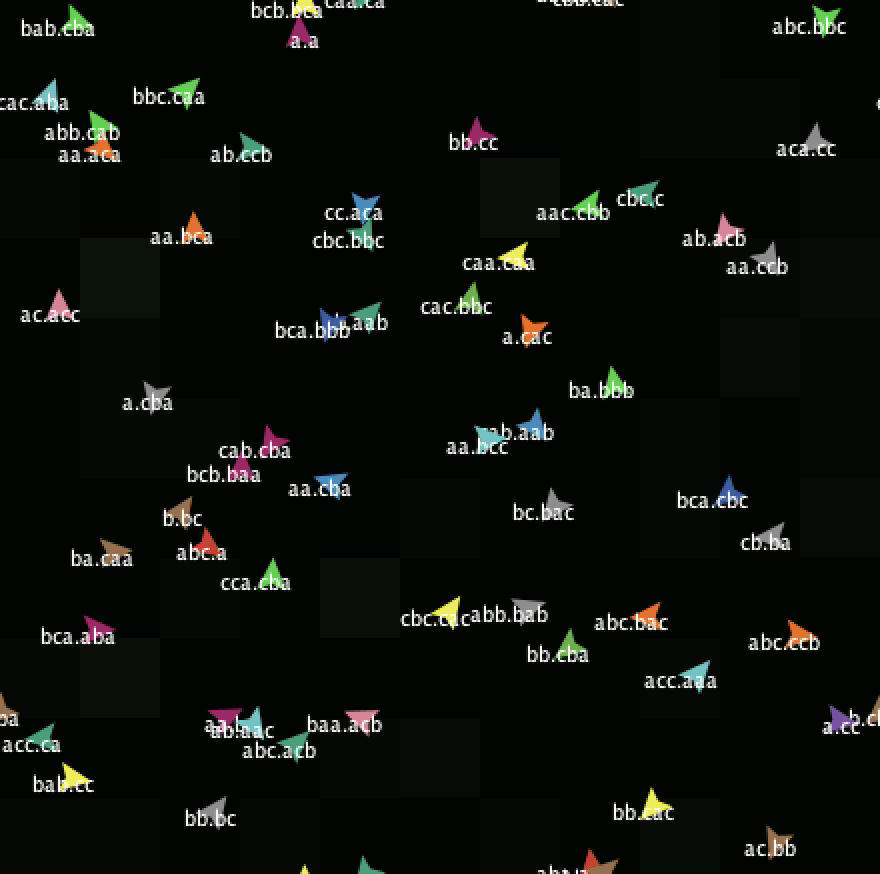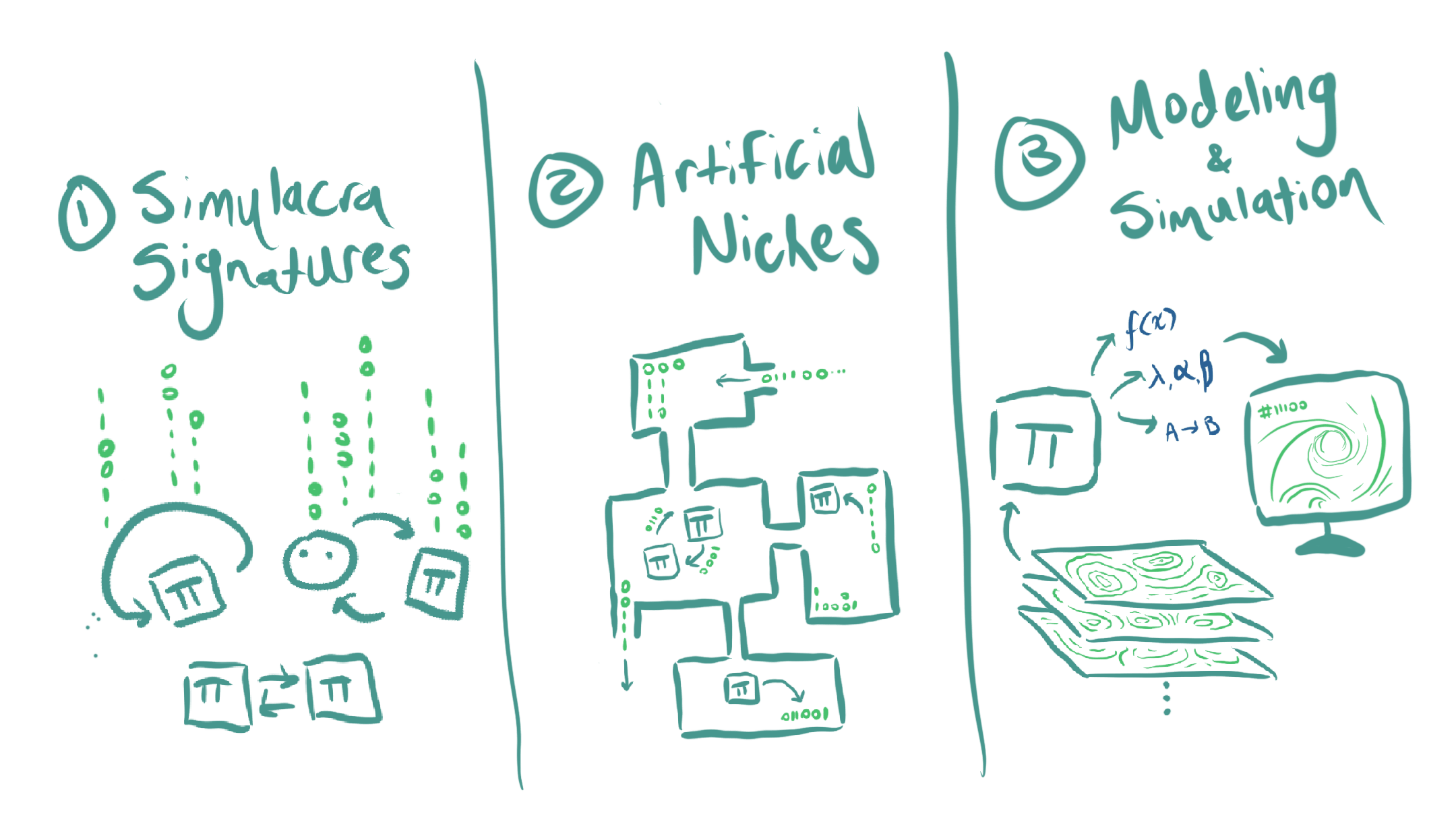I have a long and confused love-hate relationship with the field of complex systems. People there never want to give me a simple, straightforward explanation about what its about, and much of what they say sounds a lot like woo ("edge of chaos" anyone?). But it also seems to promise a lot! This from the primary textbook on the subject:
The present situation can be compared to an archaeological project, where a mosaic floor has been discovered and is being excavated. While the mosaic is only partly visible and the full picture is still missing, several facts are becoming clear: the mosaic exists; it shows identifiable elements (for instance, people and animals engaged in recognizable activities); there are large patches missing or still invisible, but experts can already tell that the mosaic represents a scene from, say, Homer’s Odyssey. Similarly, for dynamical complex adaptive systems, it is clear that a theory exists that, eventually, can be fully developed.
Of course, that textbook never actually described what the mosaic it thought it saw actually was. The closest it came to was:
More formally, co-evolving multiplex networks can be written as, [...] The second equation specifies how the interactions evolve over time as a function that depends on the same inputs, states of elements and interaction networks. can be deterministic or stochastic. Now interactions evolve in time. In physics this is very rarely the case. The combination of both equations makes the system a co-evolving complex system. Co-evolving systems of this type are, in general, no longer analytically solvable.
Which... well... isn't very exciting, and as far as I can tell just describes any dynamical system (co-evolving or no).
The textbook also seems pretty obsessed with a few seemingly random fields:
- Economics
- Sociology
- Biology
- Evolution
- Neuroscience
- AI
- Probability theory
- Ecology
- Physics
- Chemistry
"What?" I had asked, and I started thinking
Ok, I can see why some of these would have stuff in common with others.
Physics brings in a bunch of math you can use.
Economics and sociology both tackle similar questions with very different techniques. It would be interesting to look at what they can tell each other (though it seems strange to spin off a brand new field out of this).
Biology, evolution, and ecology? Sure. Both biology and ecology are constrained by evolutionary pressures, so maybe we can derive new things about each by factoring through evolution.
AI, probability theory, and neuroscience? AI and neuroscience definitely seem related. The history of AI and probability theory has been mixed, and I don't know enough about the history of neuroscience and probability theory to have a judgement there.
And chemistry??? Its mostly brought into the picture to talk about stoichiometry, the study of the rate and equilibria of chemical reactions. Still, what?
And how exactly is all this meant to fit together again?
And each time I heard a complex systems theorist talk about why their field was important they would say stuff like
Complexity spokesperson: Well, current classical economics mostly assumes you are in an economic equilibrium, this is because it makes the math easier, but in fact we're not! And similarly with a bunch of other fields! We make a bunch of simplifying assumptions, but they're all usually a simplification of the truth! Thus, complex systems science.
Me: Oh... so you don't make any simplifying assumptions? That seems... intractable?
Complexity spokesperson: Oh no our models still make plenty of simplifications, we just run a bunch of numerical simulations of toy scenarios, then make wide and sweeping claims about the results.
Me: That seems... worse?
Complexity spokesperson: Don't worry, our claims are usually of the form "and therefore X is hard to predict"
Me: Ok, a bit of a downer, but I guess scientific publishing needs more null results like that. So I guess you don't really expect your field to be all that useful when it comes to actually object-level predicting or controlling the world, more to serve as a guide to the limits of discovery?
Complexity Spokesperson: Well... not exactly, we do also have the economic complexity index which has actually been a better predictor of GDP growth than any other metric, which Hidalgo & Hausmann derived based on some nice network theory.
Me: I notice I am very, very confused.
That is, until I found this podcast with David Krakauer[1].
Now, to be clear, his framing of complex systems science is... lets say... controversial. But he is the president of the Santa Fe Institute, so not just some crackpot[2]. Anyway, he says that the phrase "complex systems" is a shortening of the more accurate phrase "complex adaptive systems". That is, complex systems are adaptive systems which are complex.
Ok, what does complex mean? I'll leave it to David to explain
0:06:45.9 DK: Yeah, so the important point is to recognize that we need a fundamentally new set of ideas where the world we're studying is a world with endogenous ideas. We have to theorize about theorizers and that makes all the difference. And so notions of agency or reflexivity, these kinds of words we use to denote self-awareness or what does a mathematical theory look like when that's an unavoidable component of the theory. Feynman and Murray both made that point. Imagine how hard physics would be if particles could think. That is essentially the essence of complexity. And whether it's individual minds or collectives or societies, it doesn't really matter. And we'll get into why it doesn't matter, but for me at least, that's what complexity is. The study of teleonomic matter. That's the ontological domain. And of course that has implications for the methods we use. And we can use arithmetic but we can also use agent-based models, right? In other words, I'm not particularly restrictive in my ideas about epistemology, but there's no doubt that we need new epistemology for theorizers. I think that's quite clear.
Now we can go back to our list:
- Economics
- Sociology
- Biology
- Evolution
- Neuroscience
- AI
- Probability theory
- Ecology
- Physics
- Chemistry
And its pretty clear how this ties together. Each field provides new math and data on the same underlying question: How would particles interact if they could "think"? Some of the above provides more foundational stuff (physics, probability theory, chemistry--in particular the study of equilibria and bottlenecks), and others provide more high-level stuff (economics, sociology, evolution, AI), but its all clearly related under this banner.
h/t Nora_Ammann ↩︎
Insofar as complex systems scientists aren't crackpots to begin with ↩︎


I forgive the ambiguity in definitions because:
1. they're dealing with frontier scientific problems and are thus still trying to hone in on what the right questions/methods even are to study a set of intuitively similar phenomena
2. it's more productive to focus on how much optimization is going into advancing the field (money, minds, time, etc.) and where the field as a whole intends to go: understanding systems at least as difficult to model as minds, in a way that's general enough to apply to cities, the immune system, etc.
I'd be surprised if they didn't run into some of the same theoretical problems involved in solving alignment. (I wouldn't be very surprised if complexity scientists make more progress on alignment than existing alignment researchers. It's hard to bet against institutions of interdisciplinary scientists in close communication with one another already applying empirical work and exploring where the information theorists and physicists of the previous century left off to study life and minds).
That being said, John Holland (one of the pioneers of complexity science, invented genetic algorithms) has written several books on the subject and has made attempts to lay some groundwork for how the field should be studied.
I think he'd probably say complex adaptive systems are an updating interaction network of 'agents' with world models trying to lower some kind of fitness function (huge oversimplification of course). He'd probably also emphasize the combinatorial nature of adaptation: structures (schemata ~ abstractions ~ innovations) can be found via mutation-like processes, assembled, tiled, and disassembled.
So we've got the textbook you mentioned which talks about co-evolving multilayer networks, Holland's adapting network of agents, and Krakauer's 'teleonomic matter' description. People might toss in other properties like diversity of entities, flows and cycles of some kind of resource (money, energy, etc), 'emergence', self-organization, etc.
I think those seem fine. I'd probably say that complex systems is something like the academic-child of frontier information theory and physics which focuses on the counterfactual evolutions of non-stationary information flows (infodynamics) when the environment contains sources and sinks of information, and when it contains memory/compression systems. Once you introduce memory and compression into the universe, information about the past and the future are allowed to interact, as well as counterfactuals. Downstream of that, I suspect, is theory of mind, acausal decision theories, embedded agency, etc. Memory systems are also 'lags' in the flow of information, which then changes what the geodesic looks like for bits.

I suspect a science of complexity will involve a lot of concepts from physics like work, energy, entropy, etc. - but they'll involve more generalized, parameterized forms which need to be fit via empirical data from a particular complex system you desire to study.
I think alignment might get a lot easier once we understand "infodynamics" far better, and the above drawing is of what I see as my current three-step, high level plan:
(1) find ways to track/measure the heat signautures (really 'information' signatures) of optimization processes/intelligences
(2) develop (open, driven-dissipative) environments that allow intelligences of different scales to move information around and interact with one another to get empirical data on how the 'information-spacetime' changes
(3) extract distilled models of the phenomena/laws going on so that rapid modeling can occur to explore the space of minds with these abstract models
Yeah, I'd be happy to.
I'm working on a post for it as well + hope to make it so others can try experiments of their own - but I can DM you.